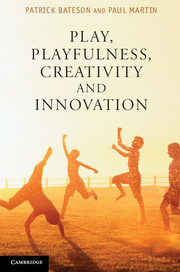Book contents
- Frontmatter
- Contents
- Advance praise
- Preface
- Acknowledgements
- 1 Introduction
- 2 The biology of play
- 3 The functions of play
- 4 Evolution and play
- 5 Creativity in humans
- 6 Animals finding novel solutions
- 7 People and organisations
- 8 Childhood play and creativity
- 9 Humour and playfulness
- 10 Dreams, drugs and creativity
- 11 Pulling the threads together
- Notes
- References
- Index
3 - The functions of play
Published online by Cambridge University Press: 05 July 2013
- Frontmatter
- Contents
- Advance praise
- Preface
- Acknowledgements
- 1 Introduction
- 2 The biology of play
- 3 The functions of play
- 4 Evolution and play
- 5 Creativity in humans
- 6 Animals finding novel solutions
- 7 People and organisations
- 8 Childhood play and creativity
- 9 Humour and playfulness
- 10 Dreams, drugs and creativity
- 11 Pulling the threads together
- Notes
- References
- Index
Summary
In this chapter, we consider the general question of play’s biological function or functions – in other words, what play is for. This question is not directed at the individual’s immediate motivation; it is concerned with how various aspects of play increase the individual’s chances of surviving and reproducing. The biological costs of play, such as they are, must presumably be outweighed by its biological benefits, otherwise animals that played would be at a disadvantage compared with those that did not, and play would not have evolved. Our central concern in this book is the link between play and creativity and hence innovation. Inasmuch as this link brings benefits in terms of enhancing the organism’s chances of survival and reproduction, the way in which play does this is one of its biological functions. However, many other functions have been proposed for play besides enhancing creativity.
The four whys
For most behavioural biologists, the difference between motivation and function is obvious, but some psychologists are uninterested in or unaware of the distinction made by Niko Tinbergen (1963). He recognised that biologists working on behaviour focus on different types of problem. Some want to know, for instance, how the expression of a particular character is controlled, while others want to know how it benefits the organism. Tinbergen pointed out that four fundamentally different types of problem are raised in biology: mechanism, development, function and evolution. These can be expressed in terms of four questions about any feature of an organism:
How does it work?
How did it develop during the lifetime of the individual?
What is it for?
How did it evolve over the history of the species?
- Type
- Chapter
- Information
- Play, Playfulness, Creativity and Innovation , pp. 28 - 41Publisher: Cambridge University PressPrint publication year: 2013



